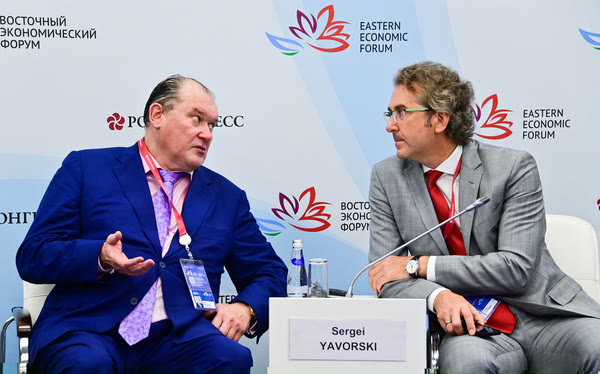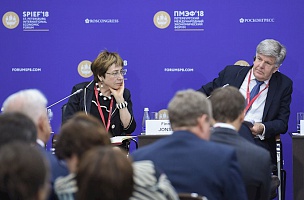KEY CONCLUSIONS
Russia has great potential in the development of unmanned vehicles
“The Russian Ministry of Transport of was the first among government institutions in the world to tackle this breakthrough subject: the unmanned technology, and not only on highways, but in all types of transport. We have several air transport projects, such as drones for the Russian Post. There is an idea of autonomous navigation, and we want to launch the first project between the ports of Kaliningrad and Ust-Luga. There are projects in railways as well, the first one will probably be the unmanned Lastochka train,” Kirill Bogdanov, Deputy Minister of Transport of the Russian Federation.
“The technology must be supported and developed. We find ourselves in the same starting position with the others where we can launch projects that promote something new and promising; this is a huge responsibility and it is very important. We have a number of projects at the State Transport Leasing Company, where we are the catalyst at the initial stage of development. We are testing the new types of aircraft, which are only yet to be launched into production by the industry, and the new types of vehicles that are still being designed,” Evgeniy Ditrikh, Chief Executive Officer, GTLK.
Unmanned vehicles are beneficial for business, as they eliminate the human factor
“I believe that drones will fit into our lives organically. This is going to entail multiple effects for the economy. An unmanned vehicle does not drink, it does not sleep, it needs no rest, it needs no blood pressure control before going on the road. We believe, all of this will decrease the costs of transportation by at least 15%, which in turn will entail a decrease in the ultimate cost of goods. An unmanned vehicle does not break the traffic rules, it does not go over the speed limit. The percentage of accidents on our roads will go down significantly, and the rates of mortality and injuries will go down as well, which will be good for demographics in our country,” Kirill Bogdanov, Deputy Minister of Transport of the Russian Federation
“The human factor is what brings losses for a business. Violation of traffic rules and forced service breaks mean – these are logistical losses. The unmanned technology minimizes and ultimately eliminates the human factor, which would allow the logistics to become faster, better, safer and more efficient,” Sergey Sergushev, Deputy General Director for Logistics, Russian Post.
PROBLEMS
The operation of unmanned vehicles lacks a regulatory framework
“There are experiments with self-driving taxis and freight transportation in China, Russia and Europe. The technology has already been developed quite well, but it exists in a certain legal void. We do not have a regulatory framework for such operation, and these experiments are being tested at some testing grounds and logistics centers, or in confined areas, at best,” Olga Arkhangelskaya, Partner, Head of Real Estate, Hospitality, and Construction Services, Head of the Transportation, Infrastructure and Government, and Public Group in the CIS, EY.
“We need the willpower to be conveyed in strategic legislations, so as to demonstrate that this will inevitably happen. At the initial stage, we need the government to determine the operators who would be managing this at first: operators of the control system, dispatchers of unmanned vehicles, or the first basic vehicle operators,” Evgeniy Ditrikh, Chief Executive Officer, GTLK.
“The question is, who is to blame if something goes wrong. Not everything is a rosy picture; there will certainly be software failures. Who will be in charge? The maker of the unmanned vehicle? Or the software developer? Or the infrastructure operator? This is a regulatory framework that has not been developed in any way,” Anton Zamkov, General Director, RT-Invest Transport Systems; Director, Digital Transport and Logistics Association.
People do not trust unmanned vehicles and fear job losses
“There is a psychological barrier. In Tatarstan, I have already traveled in a self-driving taxi, where the steering wheel turns on its own, with no one behind the wheel. It is somewhat like the transition from horse power to cars. Once upon a time in England there was a law that a person with a lantern must loudly warn the pedestrians about the approaching car without horses,” Kirill Bogdanov, Deputy Minister of Transport of the Russian Federation.
“As for the taxis, it is an extremely large-scale project. We need to think about where to create these jobs, so that the people accept it. Some must believe in technology, others must be sure that they are not out of work when the new day comes,” Anatoliy Smorgonskiy, General Director, Gett in Russia.
“The big question is: how do people feel about this? People don’t take it well. Market professionals do, but ordinary people, for the most part, do not believe in any kind of robotization. The issue of public message from the government is a very big one,” Anton Zamkov, General Director, RT-Invest Transport Systems; Director, Digital Transport and Logistics Association.
SOLUTIONS
Help from the government through developing a package of federal law for unmanned vehicles and creating infrastructure
“We are making a lot of efforts not only in the experimental legal regime, but also to adopt the law on self-driving and highly automated vehicles. First of all, it is the digitalization of all our federal highways, so that they have a digital infrastructure and means of communication for the unmanned vehicles,” Kirill Bogdanov, Deputy Minister of Transport of the Russian Federation.
“Introducing of special digital legal framework – the so-called digital sandboxes – will be greatly help to advance in the future. This is a way out for us; we can act as a one and through experimenting we can try to promote the solutions that will become legislature in the future,” Anton Zamkov, General Director, RT-Invest Transport Systems; Director, Digital Transport and Logistics Association.
“It is very important for the government to participate in creating the fixed infrastructure, which is required for the self-driving vehicles, and in stimulating the development of a mobile infrastructure – one that will be used in a vehicle and ensure its operation,” Evgeniy Ditrikh, Chief Executive Officer, GTLK.
Helping people to master unmanned technology and popularizing this field among investors
“People needs to overcome a psychological barrier, when they are on the road, and right next to them there is a truck or a taxi with no one in the driver’s seat,” Kirill Bogdanov, Deputy Minister of Transport of the Russian Federation.
“Here is the principle of working with real business: you have to work here and now, with what has already been developed. You have to work with a specific problem. There is a business model for an operator of a fleet of autonomous vehicles, and there is a business model for an infrastructure operator. We need to work with integrated models, so we need to involve the entire chain in the project at once, from logisticians to developers,” Anton Zamkov, General Director, RT-Invest Transport Systems; Director, Digital Transport and Logistics Association.






